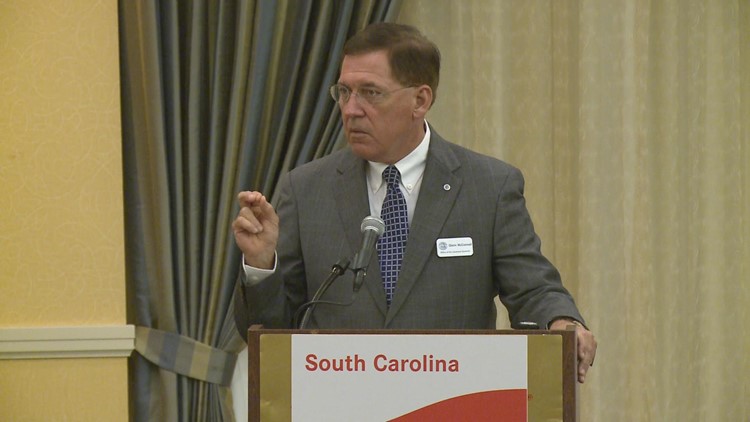Charleston, SC (WLTX) - Former South Carolina State Senator Glenn McConnell, one of the chief architects of the compromise 15 years ago that allowed the Confederate flag to remain on State House grounds, now supports the effort to remove the banner from from the capitol complex.
McConnell, who's currently the president of the College of Charleston, issued a statement Thursday on the university's website explaining his viewpoint. It comes nearly three days after South Carolina Governor Nikki Haley and other top lawmakers called for the legislature to amend state law to remove the flag.
"I support Governor Haley's call to remove the Confederate soldier's flag from State House grounds as a visible statement of courtesy and good will to all those who may be offended by it," he wrote.
McConnell also recalled serving with Clementa Pinckney, the state senator and pastor who was one of the nine people killed during the June 17 killings at Mother Emanuel AME Church in Charleston.
"His big smile lifted our spirits and his powerfully mellow voice conveyed great intelligence as well as a kind and loving heart," wrote McConnell.
McConnell said he had hoped not to comment on the issue of the flag's future until after the funerals for Pinckney and the other victims, but said the "rising tide of emotion" over Haley's announcement made staying silent impossible.
Police believe the massacre at the church was racially motivated, and images of the suspected killer that have surfaced online show him posing with the Confederate flag. After the attack, some civil and political leaders began to question the symbolic message that was being sent by having the flag at the State House.
McConnell served in South Carolina Senate for 32 years, where he eventually attained the position of Senate Pro Tempore, making him one of the most powerful politicians in the state. McConnell is also a Civil War re-enactor and was instrumental in getting the support in 2000 to raise the H.L. Hunley, the Confederate submarine that sunk off the Charleston coast in 1864.
When the controversy over the flag flying above the State House reached a boiling point in 2000, McConnell was one of the key politicians who crafted the plan to take the banner off the dome and put a similar standard at the Confederate Soldier's monument, which is on the lawn in front of the capitol building.
"The way we fixed it procedurally, it will never move again," McConnell said on July 1, 2000, the day the flag was moved. But in his statement Wednesday, McConnell acknowledged that "today is a different time."
The way the law is written, a two-thirds supermajority is required in both chambers to bring the banner down. Tuesday, both chambers agreed on a plan to begin debate on removing the flag.
One bill that was introduced calls for the symbol to be moved to the Confederate Relic Room, a museum less than a mile from the State House.
"If we all insist on it, this experience can mark the beginning of a new era," McConnell said. "Let us all pledge to respect each other and stand together in firm opposition to any efforts to sanitize, rewrite or bulldoze our history."
Here is McConnell's full statement:
"I served with Senator Clementa Pinckney in the South Carolina Senate since he joined that body in 2001. He was a friend of mine and many other senators. His big smile lifted our spirits and his powerfully mellow voice conveyed great intelligence as well as a kind and loving heart.
During this period of grief, before Reverend Pinckney and the eight other Christian martyrs killed by a hateful terrorist have yet to be buried, I had hoped to avoid commenting on political issues. However, the rising tide of emotion over Governor Nikki Haley's call to remove the Confederate soldier's flag from State House grounds and numerous requests for me to comment have made a respectful period of silence on political issues impossible.
So here is where I stand: About 15 years ago, when I was a state senator, my colleagues and I forged a bipartisan and biracial compromise. We removed the Confederate soldier's flag from atop the State House dome and relocated it behind the Confederate soldier's monument, a place of historic – not political – context. We also erected an impressive monument celebrating the many African American contributions throughout our state's history. And we passed the Heritage Act, to protect both Civil War and Civil Rights monuments, street names and building names all across the state. Our plan was designed to end acrimony and move our state forward with a spirit of good will and mutual respect. As imperfect as all compromises are, it lasted for 15 years.
Today is a different time. In the aftermath of the horrific tragedy that spilled the blood of nine souls within the hallowed halls of Mother Emanuel A.M.E. Church, the time has come to revisit the issue of the Confederate soldier's flag, which a number of our citizens regard as offensive.
Many other citizens regard the old soldier's banner as a fitting memorial to the Confederate dead. However, on State House grounds, we should seek to respect the views of all citizens as best we reasonably can.
Therefore, I support Governor Haley's call to remove the Confederate soldier's flag from State House grounds as a visible statement of courtesy and good will to all those who may be offended by it. At the same time, I also urge all public officials and activists who are focusing on this issue to come together, the way the good people of Charleston joined hands following the terrible tragedy we suffered, and agree not to transfer the fight to other physical vestiges and memorials of our state's past. In a spirit of good will and mutual respect, let us all agree that the monuments, cemeteries, historic street and building names shall be preserved and protected. How sad it would be to end one controversy only to trigger a thousand more.
The people of South Carolina are entitled to their complete history, the parts that give us pride as well as sadness. We learn from our past and we grow from exploring our shared history.
If we all insist on it, this experience can mark the beginning of a new era. Let us all pledge to respect each other and stand together in firm opposition to any efforts to sanitize, rewrite or bulldoze our history.
Here in South Carolina, there has never been a time when our nation's motto was more needed than it is today: e pluribus unum: "out of many, one." If those of us alive today can find a way to understand and respect and forgive each other, only then can we truly pay honor to the martyrs who were slain last week while they prayed together in a house of worship."



